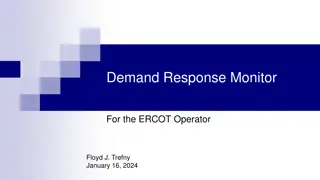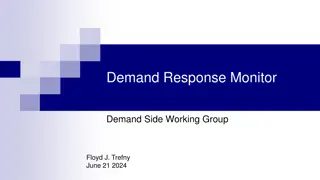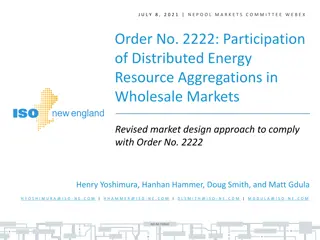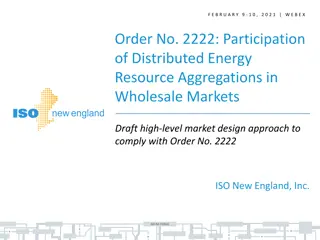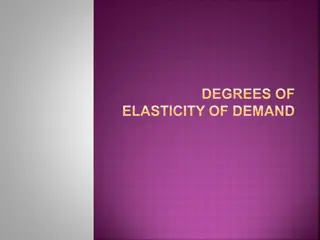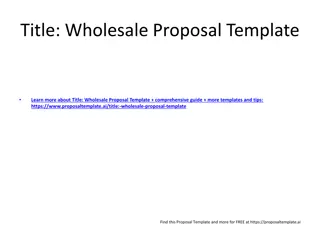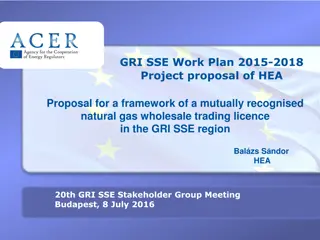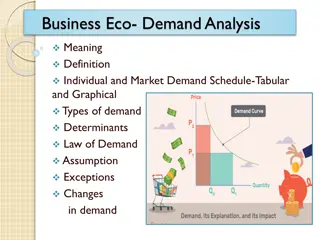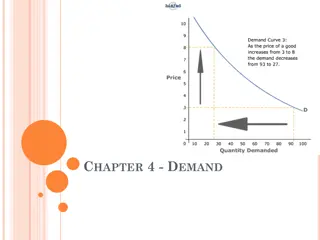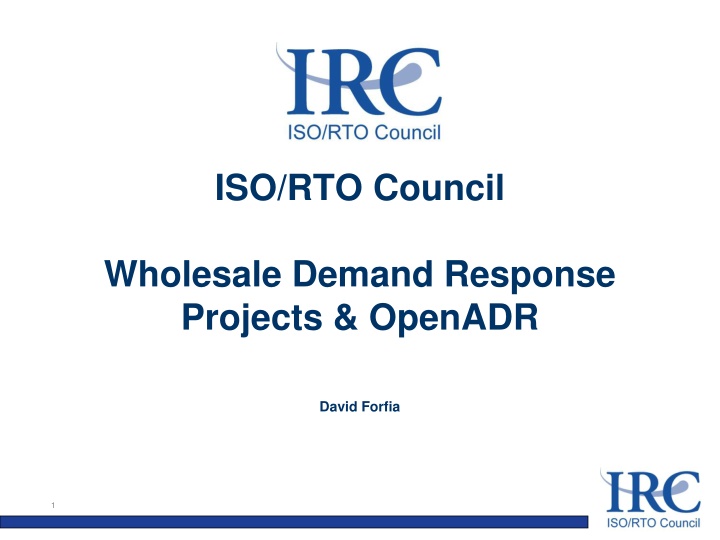
Wholesale Demand Response Projects & OpenADR Initiatives
This content discusses the Wholesale Demand Response Projects and OpenADR initiatives led by the ISO/RTO Council, including the involvement of various support organizations, standards development bodies, and the advancement of Smart Grid projects. It highlights the contributions of organizations in developing common information models, use cases, and interoperability standards for efficient energy management.
Download Presentation

Please find below an Image/Link to download the presentation.
The content on the website is provided AS IS for your information and personal use only. It may not be sold, licensed, or shared on other websites without obtaining consent from the author. If you encounter any issues during the download, it is possible that the publisher has removed the file from their server.
You are allowed to download the files provided on this website for personal or commercial use, subject to the condition that they are used lawfully. All files are the property of their respective owners.
The content on the website is provided AS IS for your information and personal use only. It may not be sold, licensed, or shared on other websites without obtaining consent from the author.
E N D
Presentation Transcript
ISO/RTO Council Wholesale Demand Response Projects & OpenADR David Forfia 1
Agenda Project Support Organizations Smart Grid Projects Project Development Process How Organizations Contribute IEC Common Information Model NAESB Measurement & Verification Use Cases IRC Profile Development Project Status
Project Support Organizations Standards Development Organizations International Electrotechnical Commission (IEC) - www.iec.ch National Institute of Standards (NIST) - www.nist.gov North American Energy Standards Board (NAESB) - www.naesb.org Organization for the Advancement of Structured Information Standards (OASIS) - www.oasis-open.org Trade & Technology Associations ISO/RTO Council (IRC) www.isorto.org Multispeak Intiative - http://www.multispeak.org/ OpenADR Alliance - http://www.openadr.org/ Smart Grid Interoperability Panel (SGIP) - http://collaborate.nist.gov/twiki-sggrid/bin/view/SmartGrid/WebHome 3
Smart Grid Projects IRC sponsored Smart Grid Initiative in 2009 Completed information model & use cases for ISO to Aggregator using Common Information Model (CIM) Submitted to NAESB Submitted to NIST Smart Grid Interoperability Panel (SGIP) Incorporated into Priority Action Plans 3 (Common Pricing Model) Incorporated into Priority Action Plan 9 (Standard Demand Response Signals) ERCOT & other ISOs were active participants in these Action Plans SGIP adopted into catalogue of standards in December 2011 A second IRC sponsored project jointly supported by the IT and Markets Committees Update 2009 IRC use cases and information model to the latest version of the CIM Create common message format using the CIM for Demand Response Map the OpenADR implementation profile to the ISO common CIM message Map the MultiSpeak implementation to the ISO common CIM message Publish the work in the US through the SGIP processes Publish the work internationally through the International Electrotechnical Commission (IEC) process 4
NAESB M&V Use Cases Performance Evaluation Types Historical Baseline Meter Before / Meter After Comparison Maximum Base Load Metered Generator Output Market Products Energy (Economic) Energy (Reliability) Capacity Reserve Regulation Deployment Type Bulk Resource Self Details about all of these concepts are defined in the NAESB Measurement & Verification Standards 7
Current Status of Objectives Complete - Update 2009 IRC use cases and information model to the latest version of the CIM Complete - Create common message format using the CIM for Demand Response Complete - Publish the work in the US through the NIST SGIP processes Complete - Map the OpenADR implementation profile to the ISO common CIM message Complete - Map the MultiSpeak implementation to the ISO common CIM message Complete SGIP Priority Action Plan 19 In Progress Work moving through IEC TC57 WG16. Included with next CIM release. Next steps Develop standard messages aligned with next CIM version All materials are available at the SGIP site for PAP19 http://collaborate.nist.gov/twiki-sggrid/bin/view/SmartGrid/PAP19WholesaleDR 8
Standards Organizations International Electrotechnical Commission (IEC) - The International Electrotechnical Commissionis the world s leading organization that prepares and publishes International Standards for all electrical, electronic and related technologies. The IEC is one of three global sister organizations (IEC, ISO, ITU) that develop International Standards for the world. National Institute of Standards (NIST) Founded in 1901, NIST is a non-regulatory federal agency within the U.S. Department of Commerce. NIST's mission is to promote U.S. innovation and industrial competitiveness by advancing measurement science, standards, and technology in ways that enhance economic security and improve our quality of life. North American Energy Standards Board (NAESB) - The North American Energy Standards Board (NAESB) serves as an industry forum for the development and promotion of standards which will lead to a seamless marketplace for wholesale and retail natural gas and electricity, as recognized by its customers, business community, participants, and regulatory entities. Organization for the Advancement of Structured Information Standards (OASIS) - OASIS (Organization for the Advancement of Structured Information Standards) is a not-for-profit consortium that drives the development, convergence and adoption of open standards for the global information society. OASIS promotes industry consensus and produces worldwide standards for security, Cloud computing, SOA, Web services, the Smart Grid, electronic publishing, emergency management, and other areas. OASIS open standards offer the potential to lower cost, stimulate innovation, grow global markets, and protect the right of free choice of technology. 10
Trade Associations ISO/RTO Council (IRC) - The ISO/RTO Council (IRC) is comprised of 10 Independent System Operators (ISOs) and Regional Transmission Organizations (RTOs) in North America. These ISOs and RTOs serve two-thirds of electricity consumers in the United States and more than 50 percent of Canada's population. MultiSpeak Intiative The MultiSpeak Initiative is a collaboration of the National Rural Electric Cooperative Association (NRECA), leading software vendors supplying the utility market, and utilities. The Initiative has developed and continues to expand the MultiSpeak Specification for Interoperability a specification that defines standardized interfaces among enterprise software applications commonly used by electric utilities. The MultiSpeak Specification is a key industry-wide standard for realizing the potential of enterprise application interoperability. The MultiSpeak Specification is the most widely applied de facto standard in North America pertaining to distribution utilities and all portions of vertically-integrated utilities except generation and power marketing. It is currently in use in daily operations of more than 600 electric cooperatives, investor-owned utilities, municipals, and public power districts in at least 15 different countries. Open ADR Alliance - The OpenADR Alliance was formed to build on the foundation of technical activities to support the development, testing, and deployment of commercial OpenADR and facilitates its acceleration and widespread adoption. This approach needs to engage service providers (such as electric utilities and systems operators) within the domain of the Smart Grid that publish OpenADR signals, as well as the facilities or third-party entities that consume them to manage electric loads. The OpenADR Alliance will enable all stakeholders to participate in automated DR, dynamic pricing, and electricity grid reliability. Smart Grid Interoperability Panel (SGIP) - The National Institute of Standards and Technology (NIST) initiated the SGIP to support NIST in fulfilling its responsibility, under the Energy Independence and Security Act of 2007, to coordinate standards development for the Smart Grid. Established in late 2009, the SGIP is a public/private partnership that defines requirements for essential communication protocols and other common specifications and coordinates development of these standards by collaborating organizations. 11



